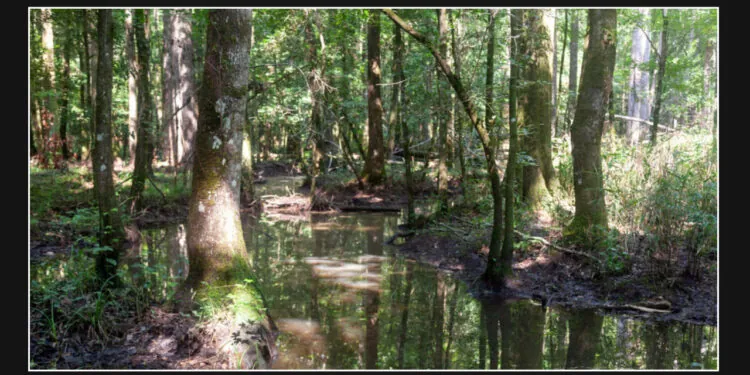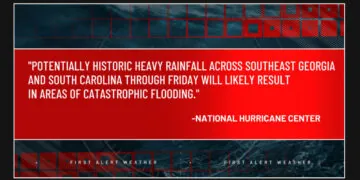The photo captured by Lisa Sorg shows a wetland located in the Croatan National Forest found in the eastern part of North Carolina. These wetlands play a vital role in mitigating the harmful impacts of climate change.
Governor Roy Cooper recently welcomed Environmental Protection Agency (EPA) Administrator Michael Regan to The Nature Conservancy’s Green Swamp Preserve, where they announced a groundbreaking $421 million grant for North Carolina and three neighboring states. The grant is aimed at preserving and restoring wetlands, forests, and coastal habitats, which are crucial for maintaining our state’s natural beauty. This funding will go a long way toward achieving our climate resilience goals, although natural solutions like this often don’t receive as much attention as those in the power and transportation sectors. Nonetheless, they are just as important in addressing the impacts of our changing climate. This grant is a significant step forward in preserving our state’s most treasured natural spaces and should be celebrated by all.
North Carolina is home to diverse landscapes, ranging from the rugged Blue Ridge mountains to vast forests, marshes, and sandy coastlines. The people of North Carolina hold these wild landscapes in high regard and understand the value and benefits they provide. Recently, the NC Department of Natural and Cultural Resources received the largest federal grant they have ever received from the EPA. This grant will be used to reforest 55,000 acres of land, as well as restore 33,000 acres of wetlands and coastal habitats in North Carolina, amongst other important initiatives.
The safeguarding of these ecosystems will not only ensure the protection of North Carolina’s families and communities but also benefit them in numerous ways. Wetlands possess an extraordinary capability to decelerate and soak up floodwaters. They offer a natural shield against flooding during hurricanes and storms, which is known to be the most expensive kind of calamity in the United States. Furthermore, well-maintained wetlands are more robust and require less expenditure as compared to man-made structures like dams or sea walls.
The state of North Carolina is rich in biodiversity, with wetlands, forests, and coastal habitats providing a home for a wide range of wildlife. These natural wonders not only allow us to engage in outdoor activities such as hunting and fishing but also contribute significantly to the state’s economy. The EPA’s investment will not only support the protection of these habitats but also advance other statewide environmental initiatives, which will help to ensure the success of existing investments.
In February 2024, Governor Cooper issued an executive order aimed at preserving one million acres of land, restoring an additional million acres, and planting one million urban trees by 2040. Alongside this, the Flood Resiliency Blueprint was launched to build resilient communities that can effectively manage flood risk and vulnerabilities. With the EPA’s grant, these initiatives are more likely to succeed, which can provide better returns on the state’s investment.
The grant will provide funding for various projects in four states, including North Carolina, South Carolina, Virginia and Maryland. Each state will be allocated $50 million, while The Nature Conservancy will receive $200 million to support initiatives in all four states.
North Carolina can benefit greatly by distributing funds to neighboring states as watersheds, consisting of both wetlands and coastal habitats, do not adhere to state boundaries. The health and resilience of habitats downstream can be impacted by what happens upstream in a watershed. Therefore, it is imperative to protect habitats in neighboring states to ensure North Carolina receives benefits such as flood protection, biodiversity and economic value.
Being an environmentalist committed to bolstering the resilience of my home state, I express my appreciation towards all federal and state leaders who have shown their unwavering commitment towards preserving North Carolina’s natural resources. Irrespective of where one’s political beliefs lie, safeguarding the state’s forests, wetlands, and other natural wonders along with their numerous advantages is a victory that will foster the growth and prosperity of our communities not just in the present but also in the future.











